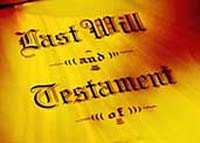

The Chicago Daily Herald’s article, “Estate planning basics and avoiding probate with a living trust,” explains that the first step in the estate planning process is preparing a list of your assets. You should review the assets you have and how they’re titled. Once you have this set, think about what you want to happen to your assets after you die.
The Basics
A basic estate plan is going to have a will. This document explains what you want done with your property after your death. A will is filed with the court upon your passing, and the executor of the will distributes your assets according to the will’s terms. Probate is a legal process whereby the courts determine how to distribute assets titled in your name among your heirs. Probate records are public records that anyone can access. The process takes approximately four to six months at a minimum, although it can often take longer. Probate is frequently required, if the total value of the probate assets exceeds a set amount, or if there is any real estate.
Assets that are held individually with no named beneficiary will go through probate. However, not all assets must go through probate. Qualified assets, such as life insurance, annuities, IRAs, and 401(k)s with named beneficiaries, will go directly to those named beneficiary(s) and will avoid probate. Those assets that have a payable on death or transfer on death designation will also pass directly to the named beneficiary(s) and avoid probate. This could be a checking or savings account. Finally, assets that are held jointly with rights of survivorship will go to the survivor. This is commonly the family home.
A Living Trust
Another option, if you’d like to keep your affairs private and have your assets pass to the intended beneficiaries without probate, is to consider a living trust as part of your estate plan. A living trust, like your will, is also a document that states where you want your assets to go after you pass. A few of the benefits of a living trust include privacy, the ability to entrust a family member, friend, or corporate trustee to distribute your assets after you die, rather than a probate judge, and saving time, money, and headaches when it is time to distribute assets after your death.
Reference: (Chicago) Daily Herald (December 22, 2016) “Estate planning basics and avoiding probate with a living trust”


